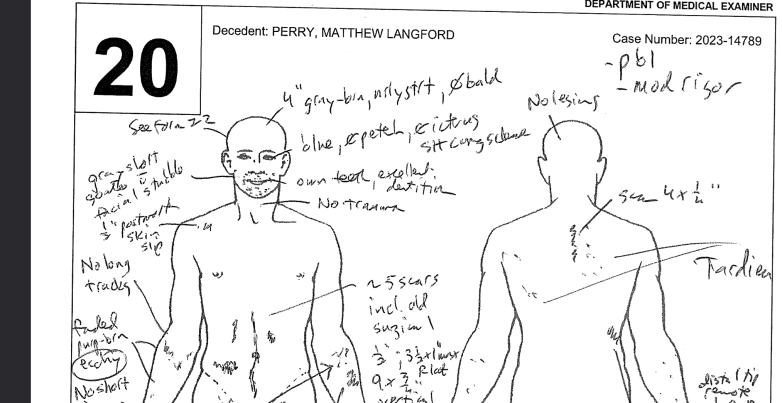
‘Friends’ star Matthew Perry’s full autopsy report reveals details of the death scene, his toxicology results, his stomach contents, and even his weight.
Be forewarned that some people may find the autopsy report details disturbing because of how specific they are. The report contains diagrams of Perry’s body, although no photos.
The report says Perry was “found unresponsive floating face down in heated end of pool.” It notes, “Prescription medications and loose pills present at residence, however none reported near pool and no medications, drugs or drug paraphernalia adjacent to the pool. No signs of fatal trauma and no foul play suspected.”
The autopsy report says that Perry was a “54-year-old male with history of chronic obstructive pulmonary disease/emphysema, diabetes; drug use in past – reportedly clean for 19 months; heavy tobacco user for many years but currently not smoking; on ketamine infusion therapy for most recent therapy reportedly one and a half weeks before death.”
Perry died from “the acute effects of ketamine,” according to a press release from the Los Angeles County Medical Examiner’s office. However, the autopsy report indicates that the medical examiner is not sure where Perry got the ketamine; the drug’s levels were too high to be from the earlier infusion therapy, the report notes.
“The County of Los Angeles Department of Medical Examiner (DME) determined the cause of death for 54-year-old actor Matthew Langford Perry as the acute effects of ketamine. Contributing factors in Mr. Perry’s death include drowning, coronary artery disease and the effects of buprenorphine (used to treat opioid use disorder). The manner of death is accident,” the report for “Matthew Langford Perry” says.
Perry died on October 28.
The Medical Examiner sent Heavy Perry’s autopsy report. Read it here: Full Matthew Perry Autopsy Report.
Here’s what you need to know:
Matthew Perry Likely Was Submersed in His Pool When He ‘Lapsed Into Unconsciousness’ From the Ketamine, the Full Autopsy Report Says

LA Co MEMatthew Perry autopsy report.
The report says “Mr. Matthew Perry’s cause of death is determined to be from the acute effects of ketamine. Contributory factors in his death include drowning, coronary artery disease, and buprenorphine effects. The manner of death is accident (drug and drowning-related). No signs of foul play are suspected in this death.”
The hyoid bone and larynx were intact and without fractures and no foreign material was present in the mouth, the report says.
“At the high levels of ketamine found in his postmortem blood specimens, the main lethal effects would be from both cardiovascular overstimulation and respiratory depression,” the report says. “Drowning contributes due to the likelihood of submersion into the pool as he lapsed into unconsciousness; coronary artery disease contributes due to exacerbation of ketamine induced myocardial effects on the heart. Buprenorphine effects are listed as contributory, even though not at toxic levels, due to the additive respiratory effects when present with high levels of ketamine.”
A single vessel in his heart showed 50-75 percent narrowing. The heart was mildly enlarged. The ketamine levels were at 3540 ng/ml. In a central blood source, they were 3271 ng/ml “For context, in monitored surgical-anesthesiologic care, levels for general anesthesia are typically in the 1000-60000 ng/ml ranges,” the report says.
“Buprenorphine is an opioid-like drug used in the treatment of opioid addiction as well as acute and chronic pain. The levels were therapeutic,” the report says, adding that, “‘c levels of the benzodiazepine lorazepam were detected as well as metabolite of clonazepam.”
Perry tested negative for alcohol, meth, cocaine, heroin, PCP, and fentanyl, the report says.
The Full Autopsy Report Says That the Ketamine in Matthew Perry’s System ‘Could Not Be’ From Infusion Therapy

GettyMatthew Perry.
Ketamine “is a disassociative anesthetic with established human medical and surgical uses. Also, it is used in recreational drug use and other illicit settings, mainly due to its ‘disassociative’ nature, indicating disconnection of mind from body,” the report says. “It also can have short-duration hallucinatory and psychedelic effects. This latter effect explains its use in nightclub/party/rave culture.”
According to the report, “The exact method of intake in Mr. Perry’s case is unknown. There were trace amounts of ketamine detected in the stomach contents. He was reported to be receiving ketamine infusion therapy for depression and anxiety. His last known treatment was 1.5 weeks prior to death and the ketamine in his system at death could not be from that infusion therapy, since ketamine’s half-life is three to four hours or less,” the report says.
It describes Perry as having a mustache and short goatee with facial stubble. There were no distinct needle punctures found. There was no evidence of a fatal injury.
He had “nephrosclerosis of kidneys” and “pancreatic fibrosis, chronic” as well as “lungs with marked anthracosis and bullous changes.” Perry also had “remote abdominal surgery with chronic fibrous adhesions of intestines” and “moderately severe aortic atherosclerosis.”
The body measured 70 inches and weighed 216 pounds. He was described as “mildly obese with a body mass index (BMI) of 31.0.”
The autopsy found “focal, moderately severe left anterior descending coronary artery atherosclerosis with proximal to mid portions ranging from 50% to 75% narrowing.” He had a “mild cardiomegaly, 465-gram heart with early left ventricular dilation.”
READ NEXT: Matthew Perry’s Girlfriend & Dating List